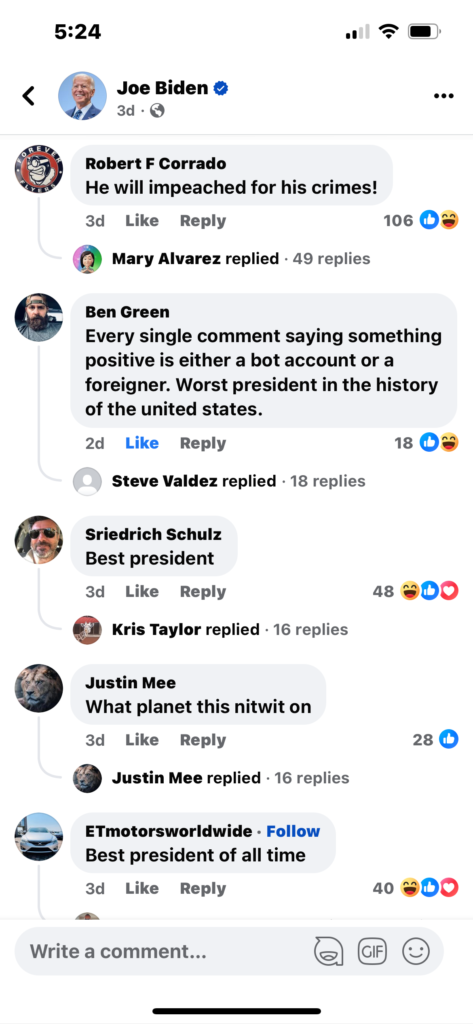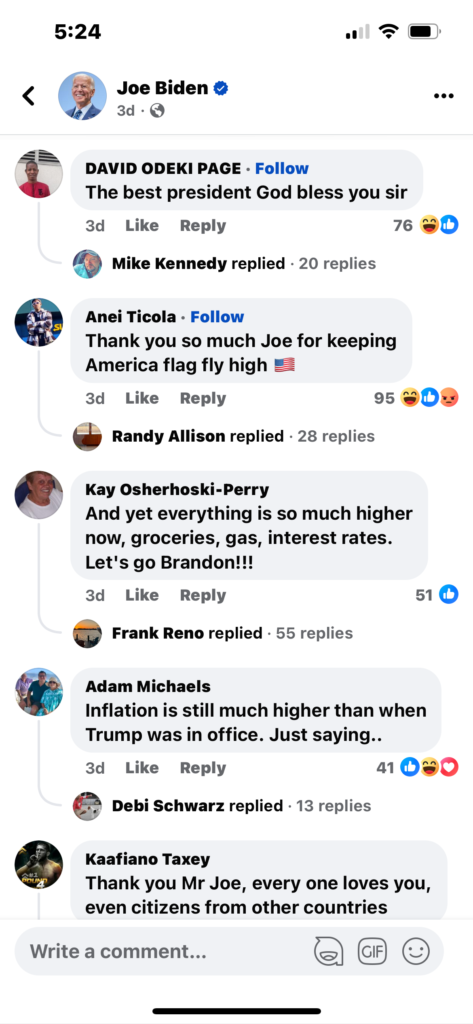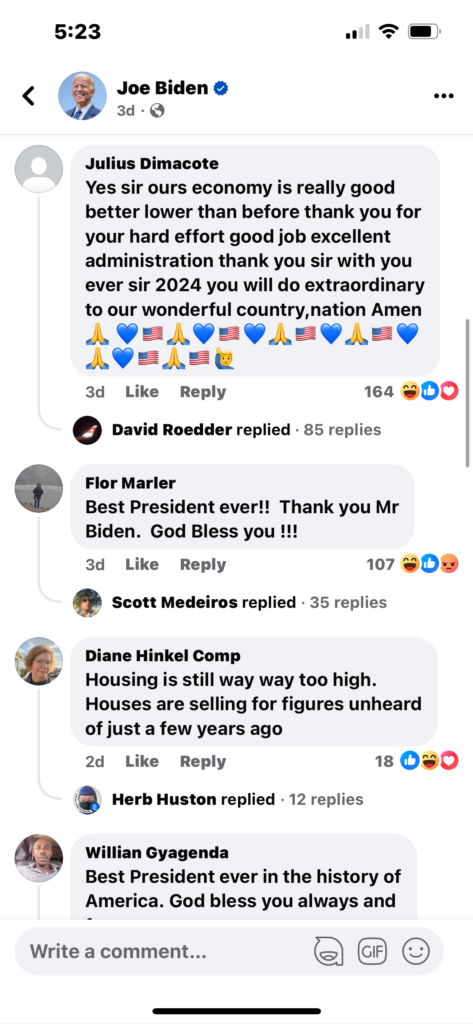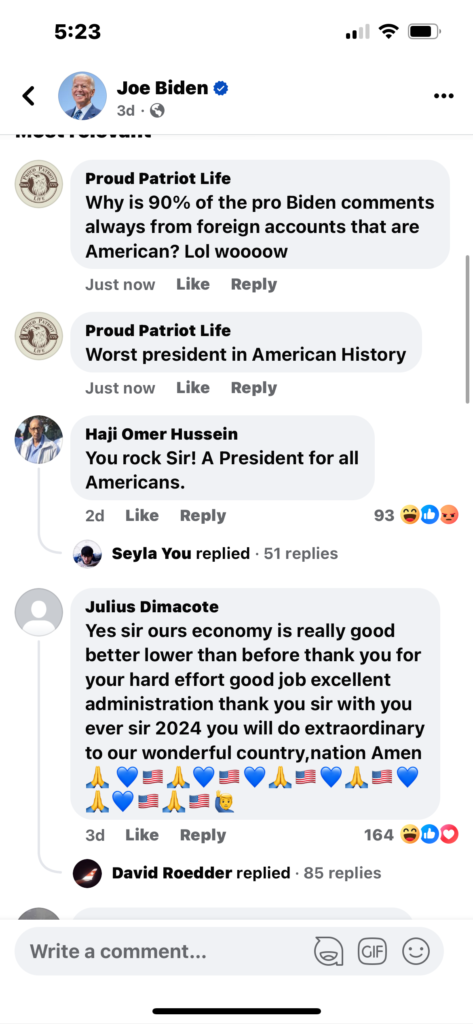A Republican’s Take on Joe Biden’s Facebook Phenomenon
As a Republican scrolling through Joe Biden’s Facebook page, I’ve stumbled upon something that’s both intriguing and a bit puzzling. It’s hard not to notice a striking pattern in the comments section of President Biden’s posts. There’s a flood of positive vibes coming from folks who don’t even live in the U.S., praising his every move. Yet, when you dig a bit deeper, you find a starkly different tone from American commenters, many of whom share concerns and criticisms about the country’s direction. This odd contrast on a platform as mainstream as Facebook raises some eyebrows and questions about what’s really going on with political discourse online.

Social Media: The New Public Square
Something just isn’t right! Sure algorithms and such, but why so many non Americans trying to prop up Biden on Facebook comments, when American profiles are negative toward him? Something is fishy about this, right?
Let’s face it, social media has become the town hall of the 21st century. It’s where everyone, from your next-door neighbor to people halfway around the world, can throw in their two cents about U.S. politics. Facebook, with its massive user base, stands out as a prime spot for political banter, debates, and, yes, even a bit of mud-slinging. But when you notice a trend like the one on Joe Biden’s page, where the cheerleading squad seems to be mostly from abroad, while homegrown comments lean towards critique and concern, it makes you wonder about the dynamics at play.
Spotting the Trend
As someone who leans Republican, I’m all for constructive criticism and open dialogue. It’s what democracy’s all about, right? But this trend on Biden’s Facebook page is hard to ignore. International fans are all thumbs up and hearts, singing praises about policies and leadership styles. Meanwhile, the American crowd seems to be on a different page, voicing worries about domestic issues and questioning policy decisions. This split-screen scenario on social media has me scratching my head, thinking about why there’s such a clear divide between the international and domestic reactions.
The Algorithm Game
Before jumping to conclusions, it’s worth considering the behind-the-scenes player in all this: Facebook’s algorithm. This invisible curator decides what comments you see first, potentially amplifying certain voices over others. Could it be that the algorithm favors positive feedback, making it more visible, or is there genuinely more international support for Biden’s presidency? Understanding the role of these algorithms is key to getting a full picture of the social media landscape and the political discourse it fosters.

The Dynamics of Social Media Engagement in Political Discourse
Navigating the choppy waters of political discourse on social media can feel like a full-time job, especially for those of us keeping a close eye on the pulse of American politics. The phenomenon observed on Joe Biden’s Facebook page, where international acclaim seems to drown out domestic dissent, is a testament to the complex dynamics of online engagement. But what’s really fueling this trend? Is it genuine global admiration, or is there more to the story?
Global Versus Domestic: A Tale of Two Audiences
The stark contrast between the international praise and domestic critique on Biden’s Facebook could be reflective of how global audiences perceive American leadership versus the lived experiences of those stateside. International commenters might focus on Biden’s stance on global issues, like climate change or international diplomacy, viewing them as positive shifts from afar. Meanwhile, Americans, dealing with the day-to-day realities of those policies, might have a more nuanced or critical perspective, focusing on immediate impacts over global gestures.
The Role of Social Media Algorithms
It’s no secret that social media algorithms play a significant role in shaping what we see online. These algorithms are designed to boost engagement by showing users content that’s likely to spark reactions, whether likes, shares, or comments. This mechanism could inadvertently amplify voices that are more supportive or critical, depending on various factors like the user’s location, interaction history, or even the specific wording of comments. The result? A skewed representation of sentiment that might not accurately reflect the broader public opinion.
Bridging the Divide
Understanding the dynamics at play requires a closer look at how social media platforms curate our online experiences. It’s crucial for users to critically assess the content they’re presented with, considering the potential biases introduced by algorithms. For those of us concerned with the direction of political discourse in the U.S., it’s equally important to engage in conversations that bridge the divide, fostering a more inclusive dialogue that transcends borders and algorithms alike.
In the realm of political engagement, the voices of Hollywood actors often resonate in the public sphere, shaping perceptions and contributing to the political dialogue. Their affiliations and endorsements can influence public sentiment, much like the comments on a Facebook page. For a deeper dive into how political affiliations shape public discourse, including those in the entertainment industry, Political Affiliations of Hollywood’s Leading Actors offers insights into the complex interplay between celebrity influence and political ideology.
As we continue to dissect the intricacies of social media engagement and political discourse, it’s clear that the conversation is multi-faceted, influenced by a myriad of factors from global perceptions to the inner workings of algorithms. The goal? To foster a more nuanced understanding of these dynamics, encouraging a political dialogue that’s both informed and inclusive.

Examining Domestic Responses and Concerns
As we delve deeper into the contrasting reactions on Joe Biden’s Facebook page, it becomes imperative to address the domestic concerns that frequently surface among American commenters. These concerns often reflect pressing national issues that directly impact the lives of U.S. citizens. From economic policies to healthcare reforms, Americans are voicing their anxieties and critiques in a public forum, seeking answers and accountability from their leadership. This section aims to unpack these domestic responses, shedding light on the underlying issues that fuel the critical commentary.
The Heart of Domestic Unease
Many of the critical comments from American users can be traced back to key issues that hit close to home for many citizens. Among these, border security remains a hot-button topic, sparking debate and concern across the political spectrum. The ongoing discussion around the U.S.-Mexico border, in particular, encapsulates a range of perspectives and proposed solutions, reflecting the complexity of achieving a balanced approach to immigration, security, and humanitarian considerations.
The U.S.-Mexico Border Security Debate
The debate on U.S.-Mexico border security is a prime example of an issue that garners significant attention and concern from American commenters on social media. Perspectives on this matter vary widely, with some advocating for stricter measures to enhance security and others emphasizing the need for compassionate policies that respect human rights and address the root causes of migration. This debate is not just about policy but about the values and priorities that guide the United States as a nation.
For those interested in exploring this debate further, including the various perspectives and potential solutions proposed by experts, policymakers, and citizens alike, The Debate on U.S.-Mexico Border Security: Perspectives and Solutions offers a comprehensive overview. Such resources can provide valuable context, helping to inform a more nuanced understanding of the challenges and considerations involved in addressing border security effectively.
Bridging the Gap Between Concern and Policy
The critical comments from Americans on social media platforms like Facebook highlight a broader need for open, constructive dialogue between the public and political leaders. Addressing domestic concerns requires not only acknowledging the issues at hand but also engaging in meaningful discussions that lead to actionable solutions. As we navigate these complex debates, it’s crucial for both sides to seek common ground, prioritizing the well-being and security of the nation while upholding the values of compassion and justice that define the American spirit.

Why Are The Positive Comments On Joe Biden’s Facebook Not Americans? Hmmmmmm
A noticeable trend on Joe Biden’s Facebook page is the overwhelming amount of positive feedback coming from non-American commenters. This phenomenon raises intriguing questions about why individuals from other countries are often the most vocal supporters of certain U.S. political figures on social media platforms. Understanding the reasons behind this international acclaim can provide insights into the global perception of American leadership and policy.
Global Perspectives on American Politics
The international community’s interest in U.S. politics is not a new phenomenon, given America’s significant influence on global affairs. From environmental policies to economic strategies, decisions made in the White House can have far-reaching implications beyond American borders. For many non-Americans, expressing support for U.S. leaders who align with their views on global issues is a way to advocate for the international policies they favor.
The Role of U.S. Leadership in Global Affairs
Joe Biden’s presidency, with its emphasis on re-engaging with allies and recommitting to multilateral organizations, has been viewed positively by many around the world. This approach contrasts with the more isolationist policies perceived in previous administrations, resonating with international audiences who value global cooperation and diplomacy. The positive comments from non-Americans may reflect relief or approval of a return to policies that prioritize global challenges, such as climate change and international security.
The Power of Social Media as a Global Platform
Social media platforms like Facebook have transformed into global stages where people from every corner of the world can observe and interact with American political discourse. This accessibility creates an environment where international voices can be heard alongside domestic opinions, sometimes amplifying the former due to their novelty or the algorithms that govern social media visibility.
Reflecting on American Influence and Heroism
The fascination and engagement with American politics by international audiences also stem from the long-standing perception of the U.S. as a land of opportunity and a beacon of democracy. Stories of American heroism and leadership on the world stage, such as those detailed in Faris Tuohy: An American Hero Through the Decades, contribute to a narrative that celebrates U.S. contributions to global peace and prosperity. Such narratives can influence international perceptions, leading to a more favorable view of current leadership that is seen as upholding these values.

As an Amazon Associate we earn from qualifying purchases through some links in our articles.



